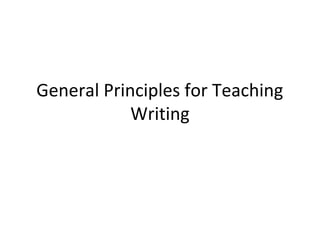
3 general principles for teaching writing
- 1. General Principles for Teaching Writing
- 2. Approaches to Writing 1) The Controlled to Free Approach 2) The Free Writing Approach 3) The Paragraph Pattern Approach 4) The Grammar-Syntax Organization Approach 5) The Communicative Approach 6) The Process Approach
- 3. The Controlled to Free Approach • In 1950s and early 1960 when the audio- lingual method dominated second language learning • at that time, emphasis on speech and writing through mastering grammatical and syntactic forms • students are given sentence exercises, then paragraphs to copy or manipulate grammatically • these controlled compositions then followed by correction of errors, so that it can lead to the free composition • this approach focuses on accuracy rather than fluency.
- 4. The Free Writing Approach • stresses writing quantity rather than quality • focuses on fluency rather than accuracy • based on the principle that if once ideas are there, the organisation follows
- 5. The Paragraph Pattern Approach • focuses on organisation by copying the paragraphs or model passages • based on the principle that in different culture or situations, people construct and organise communication with each other in different ways
- 6. The Grammar-Syntax Organization Approach • stresses on simultaneous work on more than one composition feature • it is inclusive here that writing cannot be seen as composed of separate skills which are learned sequentially • students must be trained to pay attention to organization while they also work on the necessary grammar and syntax
- 7. The Communicative Approach • focuses on the purpose of writing and the audience for it • students are given some tasks where they have to behave as writers so that they can learn by doing it - Why am I writing this? - Who will read it? • this approach is quite functional in nature, which can provide the actual experience to the learners
- 8. The Process Approach • This approach shows the shift from product to process which shows: - How do I write this? - How do I get started? • students are trained to generate ideas for writing, to think of purpose, audience, ways of communication and so on. • it's a developmental process from generating ideas to expressing them, drafting, redrafting, organizing and so on • can have three stages like: Prewriting, Writing and Post-writing (Revising or Redrafting)
